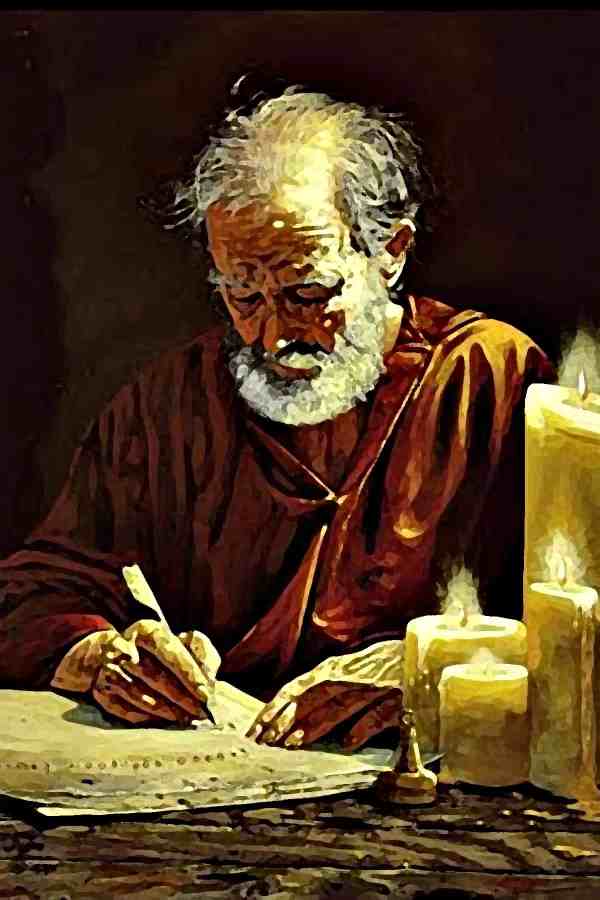Two weeks ago, as I reflected on the texts for the Second Sunday after Epiphany, I found my attention reluctantly returning to St Paul’s words in the epistle reading from 1st Corinthians 6:12-20. Today, on the Fourth Sunday after Epiphany I find my attention drawn yet again to the continuing argument Paul makes concerning freedom. The gist of his developing argument continually throws up examples in the life of the community that highlight the tension between the operation of grace and law. In chapter 8:1-13, his example concerns the hot button issue of eating meat sacrificed to idols. Context is everything – well almost. As I mentioned two weeks ago, unadulterated Paul is often a tough sell for 21st-century preachers, and listeners, alike.
The ancient Greek city of Corinth – like its modern-day counterpart – occupied a strategic position situated on the isthmus of Corinth – a narrow neck of land between the Aegean and Adriatic seas that provided a narrow land bridge connecting mainland Greece with the Peloponnese Peninsula. The significance of ancient Corinth lay in its equidistance between the two regional powers of Sparta and Athens. In counterbalancing both the political and military power of the two great rivals, Corinth played a key role within the organisation of Greek city states known as the Archean League.
Corinth controlled not only the east-west axis route between Sparta and Athens – but commanding harbors on Aegean and Adriatic sides of the isthmus is also controlled the passage of goods unloaded in one harbor and transported the short distance across the isthmus to be reloaded on ships moored in the other side – thus enabling ships to avoid the longer sea journey around the Peloponnese Peninsula.
During Rome’s conquest of the Greek city states, Corinth was destroyed by the Romans in 146 BC. It lay in ruins until a century later, when Julius Caesar began the rebuilding of Corinth as a Roman colony for the resettlement of Rome’s growing population of freed slaves originally captured in the many campaigns in the Eastern regions bordering the Mediterranean. A mixed population of Syrians, Egyptians, and of course many Jews – together with numbers of Rome’s poor transformed Corinth into an economically dynamic melting pot. With colonial status also came an infusion of Roman tax revenues – triggering a huge rebuilding program of ancient Corinth’s temples and civic buildings which had lain waste for over a century.
It was into this bustling and cosmopolitan caldron that Paul arrived sometime around 50-51AD. Luke in Acts mentions that Paul travelled to Corinth where he was joined by Silas and Timothy. We know that Paul lodged with Aquila and his wife Priscilla, two Jewish refugees from the emperor Claudius’ expulsion of Rome’s Jews in previous decade. Like Paul they were tent makers. There was always considerable business from the need to constantly repair and weave new tents and awnings to protect the Corinthians from the effects of the hot sun. Perhaps it was noting the fevered building boom, that led Paul to fashion an image for himself in Cor:3 as a skilled master builder laying the foundations on which others will build.
As a result of Jewish hostility to Paul, he left his Jewish hosts to stay with one Titius Justus – a gentile God-fearer. God-fearer was a term the Jews used for newly converted but often still unconverted gentiles who participated in the life of the synagogue. In the face of growing Jewish resistance Paul switches his missionary focus to the gentile God fearers who because of their attraction to, and familiarity with Jewish faith and custom were already primed to respond to his preaching of the gospel. Among the God-fearers many wealthy women exercised power and influence. Paul’s letters reveal that it was often to such women that he turned for support in his fledgling communities.
During his first sojourn in Corinth, two significant events occurred. The first was his penning of two letters to the Thessalonians. The second was his arraignment before the Roman Consul, Gallio, brother of Seneca, at the instigation of Corinthian Jews on a change of blasphemy. Gallio dismissed the case because Paul was a Roman citizen and he declined to judge Paul on the basis of Jewish religious matters. Vindicated, Paul nevertheless must have felt that it was time to leave Corinth sometime in late 51 or early 52AD. Later in Ephesus, sometime between 53 and 54, Paul pens his two letters to the Corinthian church.
Reading Paul’s letters is like listening to one side of a cell phone conversation. We read his responses – but as to the questions he was posed – the text is largely silent. Yet from what Paul writes we can surmise that a number of serious divisions were emerging as a reflection of Corinth’s rowdy and permissive, cosmopolitan culture.
The Corinthian church struggled with the moral issues of the right use of sex, the right attitude toward wealth. Corinthians had a reputation for sexual permissiveness and the conspicuous display of wealth – the latter leading to the denigration of the poor within the worship and community life of the church – issues not unfamiliar to modern Christian communities – for human nature has not changed much in the passage of centuries.
The Corinthian church also struggled with the corruption of the notion of truth and the importance of shared values. Paul is concerned by the charismatic sway of some teachers who assailed their hearers with alternative truths, alternative facts, alternative values rooted in baser instincts – pouring scorn on shared values of mutual respect. Yet, he is particularly worried by the report of two developments in the Corinthian church.
Many, it seems, were becoming vulnerable to the subtle invitation of teachers giving a gnostic spin to the gospel message – inviting their hearers into the allure of secret knowledge. Paul has them in his sights when he writes that knowledge puffs up, whereas love builds up. Anyone who claims to know something is really admitting that they know nothing. It is through love in action not puffed-up claims to knowledge that we become known by God.
Others were becoming susceptible to the Judaizers who demanded gentile submission to the requirements of the law. The master builder of the gospel message – Paul was always deeply worried by others erecting the wrong kind of building upon the foundations he had labored so hard to lay.
As in chapter 6 when Paul employs sexual practice to highlight the tension between what may be lawful but not necessarily beneficial, in chapter 8 he grounds his wider development of Christian freedom in the issue of food sacrificed to idols. Not an issue for us – you might think. Yet, moving beyond the immediate 1st-century contextual details –that is – the status for Christians of the pagan temple sacrificial food offerings– can we not hear Paul addressing us today – we who live in a culture characterised by a scandalous misuse of food – from food deserts to food profligacy and waste of monumental proportions?
Remember, Paul is writing in a religious context – both pagan or Jewish – where food was an integral part of religious practice. It is here we begin to grasp the revolutionary import of his words – for Paul is doing something hitherto unimaginable. He is decoupling food from religious practice. Writing prior to the first gospel, did Paul know of Jesus teaching on the subject? In any case he affirms Jesus’ words that it’s not what goes into a person that defiles but what flows out from the heart. Paul tells his readers: Food will not bring us close to God. We are no worse off if we do not eat and no better off if we do.
At the heart of his first Corinthian letter is Paul’s development of a notion of Christian freedom that flows from the grace and not from the absence of prohibition. In chapter 6, he startled his hearers by proclaiming all things are lawful for him – but though lawful not necessarily beneficial for him or those with whom he’s in relationship. In chapter 8 he further spells out this revolutionary idea.
Christian freedom does not derive from the absence of prohibition. It flows from the acceptance of responsibility for the impact of one’s actions. The sin is not in eating the wrong food. The sin lies in the offence and confusion eating it gives to other members of the same community who being younger in faith are still struggling to internalize the break with their pagan past. The limits placed on freedom come not from the regulation of rules and laws – prohibitions – but from our acceptance of shared responsibility (shared value system) – demanding of us an assessment of the impact of our actions on others.
Christian freedom’s rule of thumb is not – have I the right to do this thing – but what will the impact be for others if I do so? Can there be no more urgent a question for our 21st-century ears. It’s the burning question in America today. Might I also suggest it’s a central question for the Sunday of the Annual Meeting – when we celebrate our community’s achievements in the previous year – and holding this question before us as we prepare to meet the challenges and grasp the opportunities ahead?


